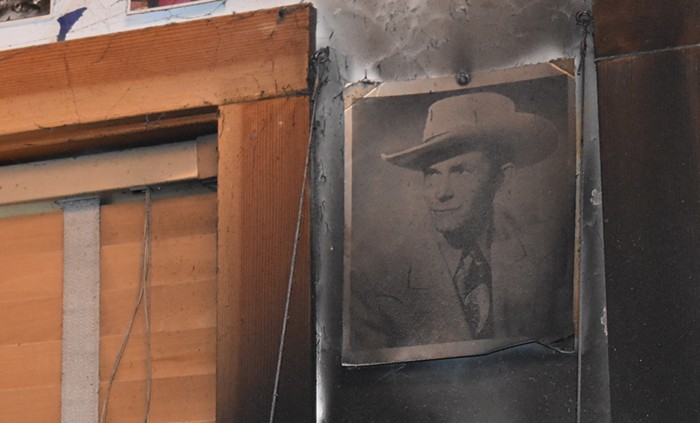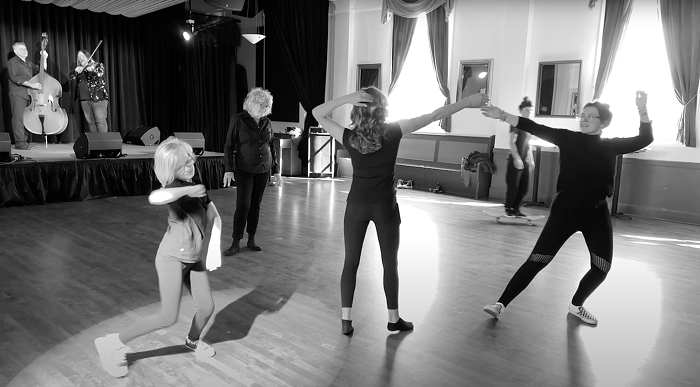ELIZABETH MORRIS is fighting a cold.
"I've invested in some of your strong American cold medicine," she says, "so I've got DayQuil and NyQuil."
The Australian-born singer and her London-based band Allo Darlin' are on their fifth tour of the States. "I'm really trying to be a bit healthy and I haven't really been drinking on this tour at all. Same with Mike [Collins], our drummer," Morris says. "So that means that Bill [Botting, bassist] and Paul [Rains, guitarist] are getting all the drink tickets. It's working out pretty well for them, I think! We've got a nice little balance of Mike and I being the grandparents and the other guys being the teenagers. Still, I thought the reason that you end up feeling quite rotten on tour is because you drink, but actually I haven't been drinking, and I still feel rubbish!"
The tour is a reunion of sorts for the four friends, as Morris is currently living in Florence, Italy, with her husband while he works on his Ph.D. "It's a bit tricky, how you keep a band together when everybody's working a lot and has family commitments and all of this stuff," she says. "But I think it kind of ties in to part of getting older. It's hard enough to get us together anyway. So it just means that we have to be a lot more organized and know what we're doing quite far in advance. Yeah, it's a bit tricky, and it costs us a bit of money, but that's okay. It's not prohibitive. And for me the payoff of living in Italy is definitely worth it."
A small Florentine influence can perhaps be heard on songs like "Santa Maria Novella" on Allo Darlin's splendid third album, We Come from the Same Place, but by and large, it was written before Morris made the move. As such, it picks up the thread from the group's outstanding 2012 album Europe with sweet, perfectly hatched pop songs that deal with love, loss, and the passage of time with simplicity and elegance. More than their previous albums, though, We Come from the Same Place is set during those dusky final instants of the twilight of youth—the point in one's life when the leaping heights of hope and agony give way to something more measured and mature, yet just as emotionally affecting.
The record is more economical, too, something that came from Allo Darlin' touring with English trio (and live powerhouse) the Wave Pictures, whose pared-back approach to recording and barebones rock 'n' roll rubbed off on their tourmates on new songs like "Romance and Adventure."
"We were influenced by them in the way that they do it as a live take, trying to play as well as they can—which is quite different than how our previous album, Europe, was recorded," Morris says. "It came naturally by that point, because we'd played out the songs quite a bit, and we'd rehearsed quite a lot, which we really hadn't done terribly much with the previous two [albums]."
There are fewer overdubs on the new record, too, and songs like the simultaneously wistful and exuberant "Crickets in the Rain" and the plainspoken "Angela" benefit from the direct approach. "Instead of Paul playing five different guitar parts, let's make one really good part and put all those ideas into one bit," Morris explains. "And hopefully, if the songs are good enough, then you don't really need everything else on top of it. When you do it that way, it feels less laborious, actually. In some ways it's more enjoyable to record that way."
The songs need little ornamentation. Morris' ukulele and Rains' lap steel guitar make a few appearances on We Come from the Same Place, but otherwise the album is built on the band's surprising muscle and power, an almost punk-flirting element not evident outside of the band's live shows. And Morris' way with a lyric—creating relatable images and stories by pinpointing very specific details—permits the listener to fuse their own emotions onto the songs. It's what fans have come to love about Allo Darlin', who draw from wells of nostalgia without glopping on the sentiment. Additionally, the new record points forward to the uncertainty and excitement of the future.
"The song 'History Lessons' is really specifically dealing with that—[the fact] that everything changes and we kind of struggle to cope with change, and that actually maybe it's okay that things change and it doesn't always have to be better in the past," Morris says. "It was really written in response to this idea that, when things close, everything new is bad and everything old is wonderful, which is obviously not true, you know. It's very easy to get stuck in that way of thinking—not just in terms of a relationship, but in terms of the city or the place where you live. When you think like that, you can stop trying to take part in the present."



















